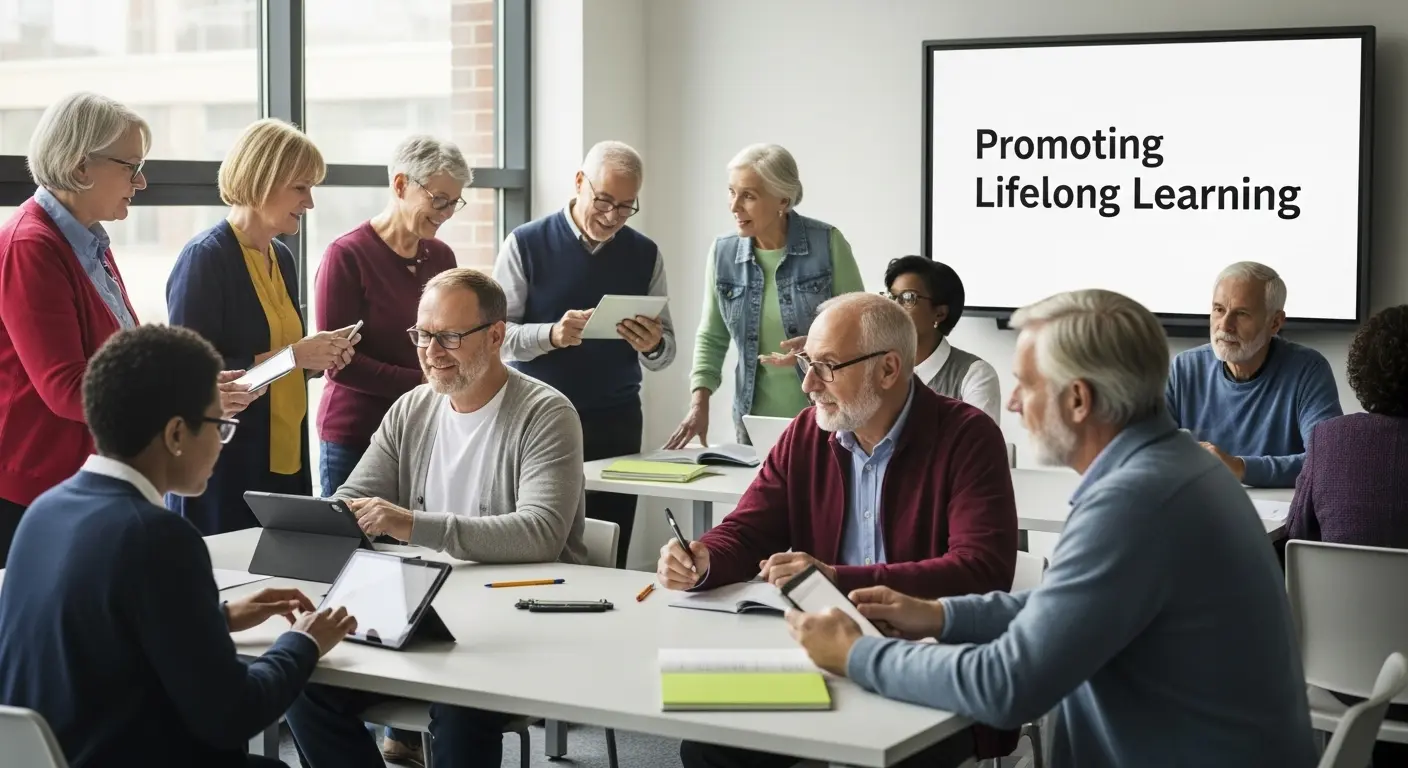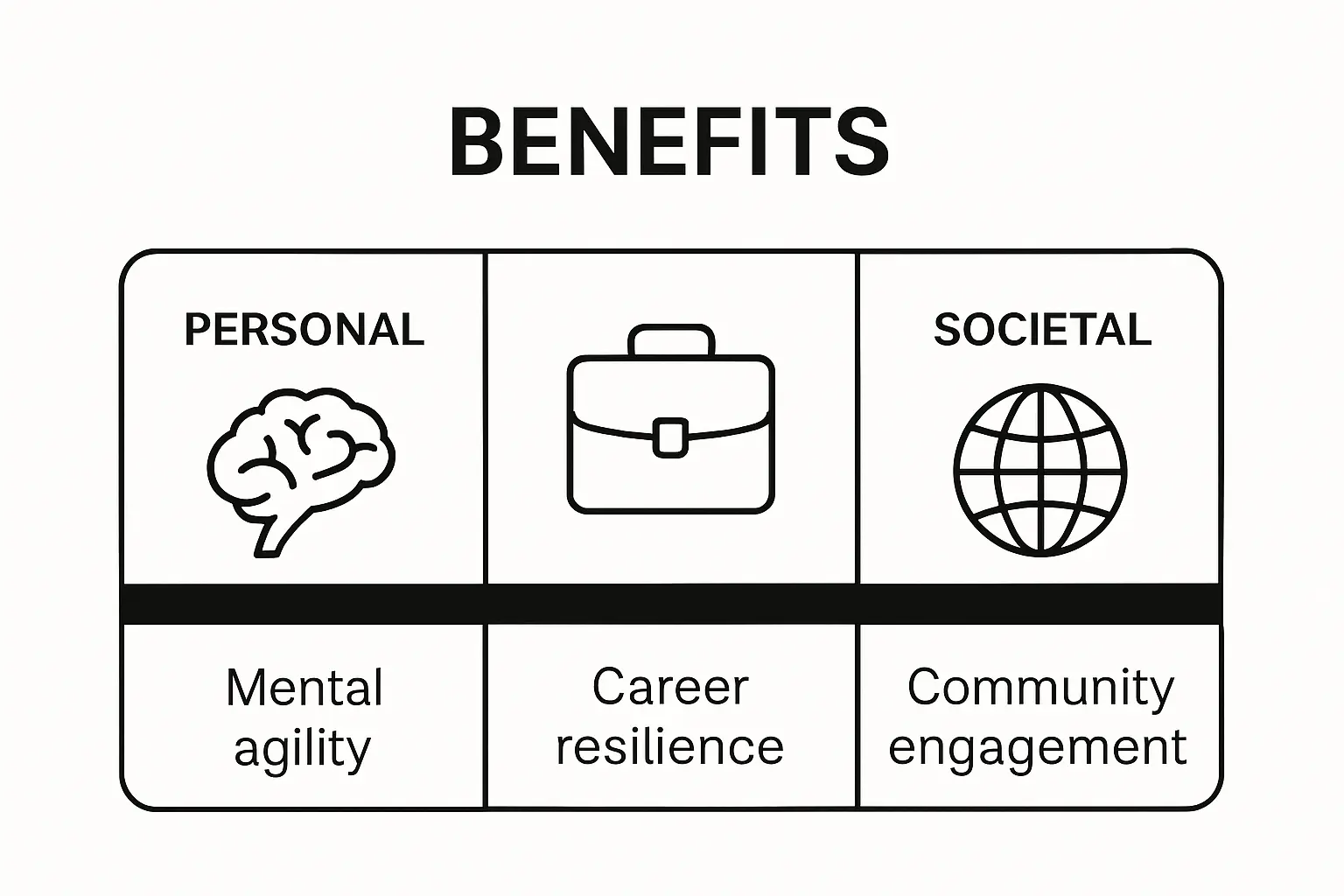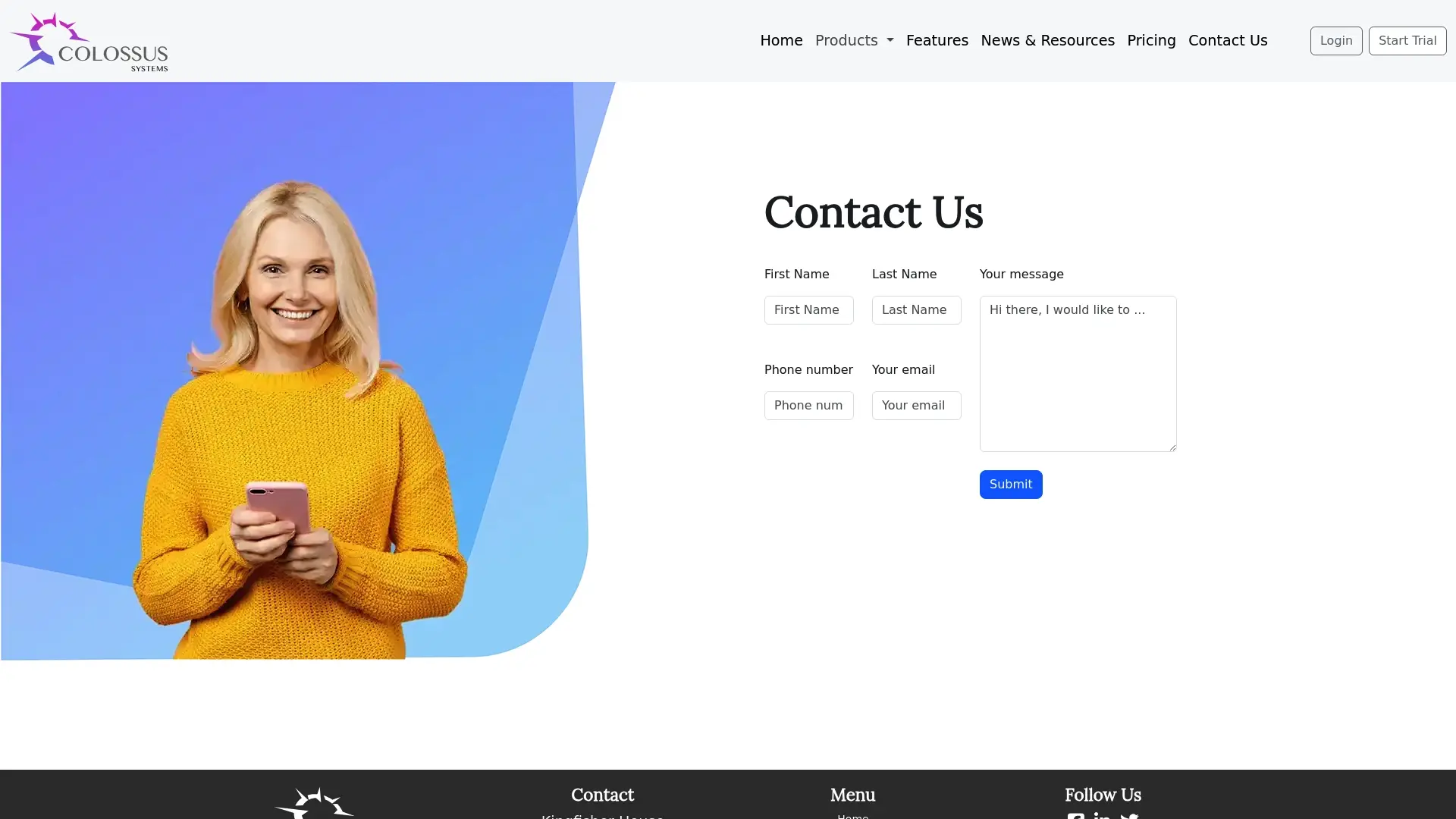Understanding Promoting Lifelong Learning for Everyone

Lifelong learning means more than just going to school. People who keep learning new things are not only sharper but also healthier, with research showing continuous learning can improve cognitive function well into old age. Most people think learning ends with graduation but that is only the beginning for those who want to stay ahead and truly thrive.
Table of Contents
- What Is Lifelong Learning And Its Purpose?
- Why Promoting Lifelong Learning Matters Today
- How Lifelong Learning Benefits Individuals And Communities
- Key Concepts In Promoting Lifelong Learning
- Real-World Examples Of Lifelong Learning Initiatives
Quick Summary
| Takeaway | Explanation |
|---|---|
| Lifelong learning is crucial for adaptability | Embracing lifelong learning helps individuals navigate changing job markets and technologies effectively. |
| It enhances personal and professional growth | Continuous skill development fosters resilience, self-confidence, and a deeper understanding of oneself and the world. |
| Communities benefit from inclusive learning | Lifelong learning initiatives create informed, engaged citizens who contribute positively to societal progress and cohesion. |
| Motivation is key to lifelong learning | Self-directed and intrinsically motivated learners are more likely to engage in continuous education and skill acquisition. |
| Support systems facilitate effective learning | Educational institutions and employers should provide flexible, accessible pathways and recognition for varied learning experiences. |
What is Lifelong Learning and Its Purpose?
Lifelong learning represents a holistic approach to personal and professional development that transcends traditional educational boundaries. Unlike formal education confined to specific years, this concept embraces continuous knowledge acquisition and skill enhancement throughout an individual’s entire life journey.
Understanding the Core Concept
At its foundation, lifelong learning is a deliberate and ongoing commitment to expanding one’s knowledge, skills, and capabilities beyond structured academic environments. UNESCO defines lifelong learning as an integrated approach encompassing personal, professional, social, and civic dimensions of human growth. This philosophy recognizes that learning is not limited to classrooms or specific age ranges but is a dynamic, perpetual process.
The following table outlines the key characteristics that define lifelong learning as described in the article, providing a clear overview for readers to reference at a glance.
| Characteristic | Description |
|---|---|
| Self-motivated learning | Driven by personal curiosity and intrinsic motivation |
| Adaptability | Enables individuals to navigate rapidly changing professional landscapes |
| Continuous skill development | Supports ongoing personal and career growth |
| Holistic approach | Integrates personal, professional, social, and civic dimensions |
| Beyond the classroom | Recognises learning as a dynamic, perpetual process outside formal education |
Key characteristics of lifelong learning include:
- Self-motivated learning: Driven by personal curiosity and intrinsic motivation
- Adaptability: Enables individuals to navigate rapidly changing professional landscapes
- Continuous skill development: Supports ongoing personal and career growth
Purpose and Significance
The primary purpose of lifelong learning extends far beyond academic achievement. It serves multiple critical functions in an individual’s personal and professional development. By continuously acquiring new knowledge and skills, people become more adaptable, resilient, and capable of thriving in an increasingly complex global environment.
Professional benefits include enhanced employability, increased career opportunities, and the ability to remain competitive in evolving job markets. Personal benefits encompass intellectual stimulation, improved confidence, and a deeper understanding of oneself and the world. Moreover, lifelong learning contributes to broader societal progress by creating more informed, skilled, and engaged citizens who can contribute meaningfully to their communities.
Ultimately, lifelong learning is not just an educational strategy but a transformative approach to personal growth, enabling individuals to continuously reinvent themselves, pursue meaningful experiences, and maintain intellectual curiosity throughout their entire lives.
Why Promoting Lifelong Learning Matters Today
In an era of rapid technological transformation and unprecedented global complexity, promoting lifelong learning has become more critical than ever. The traditional model of education ending with formal schooling no longer suffices in preparing individuals for dynamic professional and personal landscapes.
Responding to Technological and Economic Changes
Modern economies are experiencing unprecedented disruption driven by technological advancements and automation. UNESCO highlights that lifelong learning is essential for creating adaptive, resilient societies capable of navigating constant change. Workers must continuously update their skills to remain relevant and competitive in job markets characterized by emerging technologies like artificial intelligence, machine learning, and digital transformation.
Key economic imperatives for promoting lifelong learning include:
- Skill relevance: Ensuring workforce capabilities match evolving industry requirements
- Career resilience: Enabling professional adaptability and minimizing unemployment risks
- Innovation potential: Cultivating a workforce capable of creative problem solving
Social and Personal Empowerment
Beyond economic considerations, promoting lifelong learning represents a powerful mechanism for individual and societal empowerment. It democratizes knowledge acquisition, providing opportunities for personal growth regardless of age, background, or previous educational experiences. Read more about strategies for online learning engagement to understand how technology can facilitate continuous learning.
Lifelong learning contributes to personal development by fostering critical thinking, emotional intelligence, and self-awareness. It helps individuals develop broader perspectives, challenge existing assumptions, and remain intellectually curious. Moreover, it supports mental health by providing cognitive stimulation and opportunities for meaningful personal exploration.
In a world characterized by rapid change, promoting lifelong learning is not just an educational strategy but a fundamental approach to human development. It equips individuals with the knowledge, skills, and adaptability required to thrive in complex, interconnected global environments, ultimately creating more informed, resilient, and engaged citizens.
How Lifelong Learning Benefits Individuals and Communities
Lifelong learning transcends individual skill development, creating profound positive impacts that ripple through personal lives and broader societal structures. Its benefits extend far beyond traditional educational achievements, fostering holistic growth and community transformation.
Individual Personal Development
Research from the National Institutes of Health demonstrates that continuous learning significantly enhances personal well-being. Individuals who embrace lifelong learning experience improved cognitive function, increased self-confidence, and greater emotional resilience. These personal growth opportunities enable people to adapt more effectively to life changes, develop deeper self-understanding, and pursue meaningful personal and professional goals.
Key personal benefits include:

- Cognitive flexibility: Maintaining mental sharpness and neurological health
- Emotional intelligence: Developing stronger interpersonal skills and self-awareness
- Personal fulfillment: Creating opportunities for continuous self-discovery
Community and Societal Impact
Beyond individual advantages, lifelong learning generates substantial community benefits. Discover more about leadership development strategies that can support community growth through continuous learning. By promoting knowledge sharing and skill development, communities become more innovative, inclusive, and adaptable.
Lifelong learning contributes to social cohesion by reducing economic disparities, enhancing civic participation, and creating more informed citizens. When individuals continuously update their skills and knowledge, they become active contributors to community problem solving, cultural understanding, and collective progress.
The ripple effects of lifelong learning are profound.
 It empowers marginalized groups, supports intergenerational knowledge transfer, and creates more resilient social structures. By valuing continuous learning, communities invest in their most important resource human potential enabling individuals to grow, contribute, and thrive in an increasingly complex global environment.
It empowers marginalized groups, supports intergenerational knowledge transfer, and creates more resilient social structures. By valuing continuous learning, communities invest in their most important resource human potential enabling individuals to grow, contribute, and thrive in an increasingly complex global environment.
This table compares the individual and community benefits of lifelong learning, helping to clarify how its impact extends both personally and collectively as discussed in the article.
| Level | Key Benefits |
|---|---|
| Individual | Improved cognitive function, increased self-confidence, greater emotional resilience, personal fulfilment |
| Community | Enhanced social cohesion, reduced economic disparities, more informed citizens, community innovation |
| Societal | Intergenerational knowledge transfer, empowerment of marginalised groups, resilient social structures |
Key Concepts in Promoting Lifelong Learning
Promoting lifelong learning requires a strategic and multifaceted approach that addresses individual motivations, institutional support, and systemic barriers. Understanding these key concepts is crucial for creating effective learning ecosystems that empower individuals to engage in continuous personal and professional development.
Individual Motivation and Learning Strategies
At the core of promoting lifelong learning lies the cultivation of intrinsic motivation and self-directed learning capabilities. Individuals must be equipped with the skills, mindset, and resources to take ownership of their learning journeys. Research in educational psychology emphasizes the importance of autonomy, curiosity, and personal relevance in sustaining long-term learning engagement.
Key strategies for individual motivation include:
- Goal setting: Establishing clear, achievable learning objectives
- Self-reflection: Developing metacognitive skills to understand personal learning processes
- Curiosity cultivation: Creating environments that encourage exploration and questioning
Institutional and Systemic Support
Learn more about effective online training approaches that can support lifelong learning initiatives. Promoting lifelong learning requires comprehensive support from educational institutions, employers, and policymakers. This involves creating flexible learning pathways, recognizing diverse forms of knowledge acquisition, and removing financial and accessibility barriers.
Critical systemic considerations include:
- Flexible learning formats: Offering modular, online, and part-time learning options
- Recognition of prior learning: Developing frameworks that value informal and non-formal learning experiences
- Financial support: Creating scholarship, grant, and subsidized learning opportunities
Successful promotion of lifelong learning demands a holistic approach that simultaneously addresses individual motivation, institutional support, and broader societal infrastructure. By understanding and implementing these key concepts, we can create more inclusive, adaptable, and empowering learning environments that enable individuals to continuously grow, adapt, and thrive in an ever-changing world.
Real-World Examples of Lifelong Learning Initiatives
Lifelong learning is not merely a theoretical concept but a practical approach increasingly adopted by organizations, governments, and individuals worldwide. These real-world initiatives demonstrate innovative strategies for promoting continuous learning across diverse contexts and sectors.
Workplace Learning Programmes
International Labour Organization research highlights how progressive organizations are embedding lifelong learning into their corporate cultures. Companies like Google and Microsoft have pioneered comprehensive learning and development programmes that encourage employees to continuously upgrade their skills through internal training, conference attendance, and subsidized external education.
Notable workplace learning initiatives include:
- Skill rotation programmes: Enabling employees to explore different roles and departments
- Continuous professional development credits: Providing structured learning opportunities
- Microlearning platforms: Offering bite-sized, accessible training modules
Government and Community Learning Strategies
Learn more about leadership development strategies that can inspire community learning initiatives. Governments worldwide are implementing national lifelong learning policies to support citizen education. For instance, Singapore’s SkillsFuture programme provides citizens with credit grants to pursue continuous learning, while Nordic countries have long-standing traditions of offering free or subsidized adult education courses.
Community learning approaches encompass:
- Public library learning programmes: Offering free workshops and digital skills training
- Community college flexible curricula: Creating accessible learning pathways
- Online learning platforms: Providing free or low-cost educational resources
These real-world examples demonstrate that lifelong learning is a dynamic, adaptable concept with tangible implementations across various sectors. By creating supportive ecosystems that value continuous learning, organizations and communities can empower individuals to develop skills, adapt to changing environments, and pursue personal and professional growth throughout their lives.
Unlock Lifelong Learning Engagement for Your Organisation
Struggling to translate the ideals of lifelong learning into practical results for your members? Many organisations know that continuous skill development and active engagement are essential, but face barriers like disconnected systems, low participation in online trainings, and time-consuming member management. If your association or nonprofit aims to empower individuals with streamlined course access, virtual training and vibrant event experiences, Colossus Systems offers the unified tools you need to make a real impact.

Let your mission thrive. Use a platform built for adaptability, robust CRM and communication, and effortless event planning to foster true lifelong learning across your community. Discover how to streamline engagement and training today. Ready for a customised solution that helps members grow and stay connected? Get in touch with our team via Colossus Systems Contact and take the next step toward a more skilled, resilient membership community.
Frequently Asked Questions
What is the definition of lifelong learning?
Lifelong learning is a continual, self-motivated pursuit of knowledge and skills for personal and professional development throughout an individual’s life, extending beyond formal education.
Why is promoting lifelong learning important?
Promoting lifelong learning is crucial for enhancing employability, achieving personal growth, fostering innovation, and creating more adaptable, informed communities in a rapidly changing world.
How can individuals engage in lifelong learning?
Individuals can engage in lifelong learning by setting personal goals, exploring online courses, attending workshops, participating in professional development programs, and seeking opportunities for self-directed study.
What role do institutions play in supporting lifelong learning?
Educational institutions and employers can support lifelong learning by providing flexible learning pathways, recognising prior learning, offering financial aid, and creating environments that encourage continuous skill development.
Recommended
- Online Learning Engagement: Practical Strategies for Organisations|CS
- Understanding the Benefits of Online Training | Colossus Systems
- Understanding Leadership Development Programs in Detail|CS
- Understanding Leadership Development Strategies | Colossus Systems
- Making Learning Fun: Engaging Activities for Your Kids – The Zoofamily
- Understanding Interactive Learning Experiences for Educators - Academic Entertainment